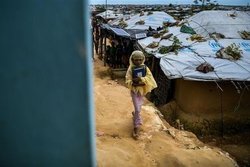 Amnesty International has lambasted India for its disregard for international law after a Rohingya family was deported to Myanmar where the persecuted Muslim minority has been subjected to “genocide” by the Myanmarese military.
Amnesty International has lambasted India for its disregard for international law after a Rohingya family was deported to Myanmar where the persecuted Muslim minority has been subjected to “genocide” by the Myanmarese military. RNA - The five-member Muslim family, which had been behind bars in India’s northeastern Assam state since 2013, was handed over to Myanmar authorities on Thursday, the UK-based rights group said in a statement on Monday.
The controversial repatriation by New Delhi occurred just a few months after seven male members of the minority were also returned to the Southeast Asian country.
The United Nations has already voiced its concern over the forcible repatriation of the Rohingya Muslims while rights groups warned the Indian government was putting the community at serious risk by returning them to Myanmar, where for decades the minority has been subjected to violent pogroms by the military.
The Rohingya are considered the world’s most persecuted minority, attacked and driven out of their native Rakhine State in northwestern Myanmar in what the UN investigators have said remains an “ongoing genocide.”
“The Rohingya population in Rakhine state in Myanmar continues to live under a system of apartheid,” Amnesty India’s Abhirr V. P. said in a statement.
“The expulsion of asylum-seekers and refugees amounts to a violation of India’s obligations under customary international law, which prohibits governments from returning people to a territory where they are at risk of serious human rights violations,” he added.
Meanwhile, the UN refugee agency said that despite repeated requests they were not granted access to the Rohingya family detained in Assam before they were forced to return to Myanmar.
India, which is not a signatory to the UN Refugee Convention, says that some 40,000 Rohingya are living in the country, where Hindu hardliners have repeatedly called on New Delhi for their mass deportation.
According to the UN figures, around 18,000 members of the minority are registered in India with the UN refugee agency.
Last week, India's home ministry said at the parliament that 478 Rohingya Muslims had been arrested between 2015 and 2018, with last year topping the list with 230 arrests along the Indian borders.
The Rohingya Muslims were subjected to a campaign of killings, rape, arbitrary arrests, and arson attacks by the military and Buddhist mobs in Rakhine mainly between late 2016 and August 2017.
The brutal campaign forced some 700,000 Rohingya to flee their homeland since August 2017 and seek refuge in neighboring Bangladesh. There, they are confined to squalid, overcrowded camps and face forced return back to Myanmar.
The Rohingya Muslims, who have lived in Myanmar for generations, are denied citizenship and are branded illegal emigrants from Bangladesh, which likewise denies them citizenship.
847/940